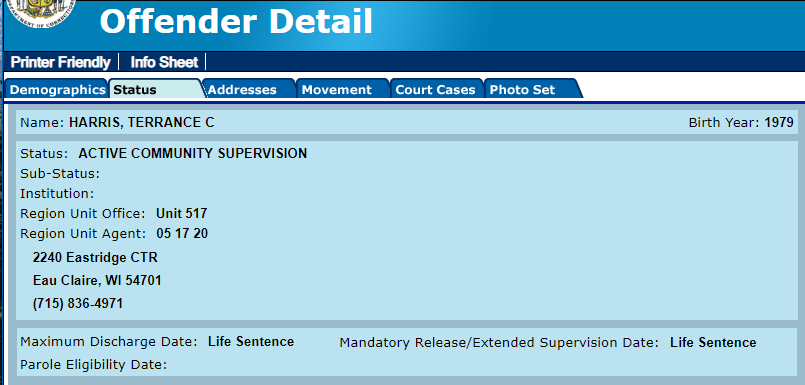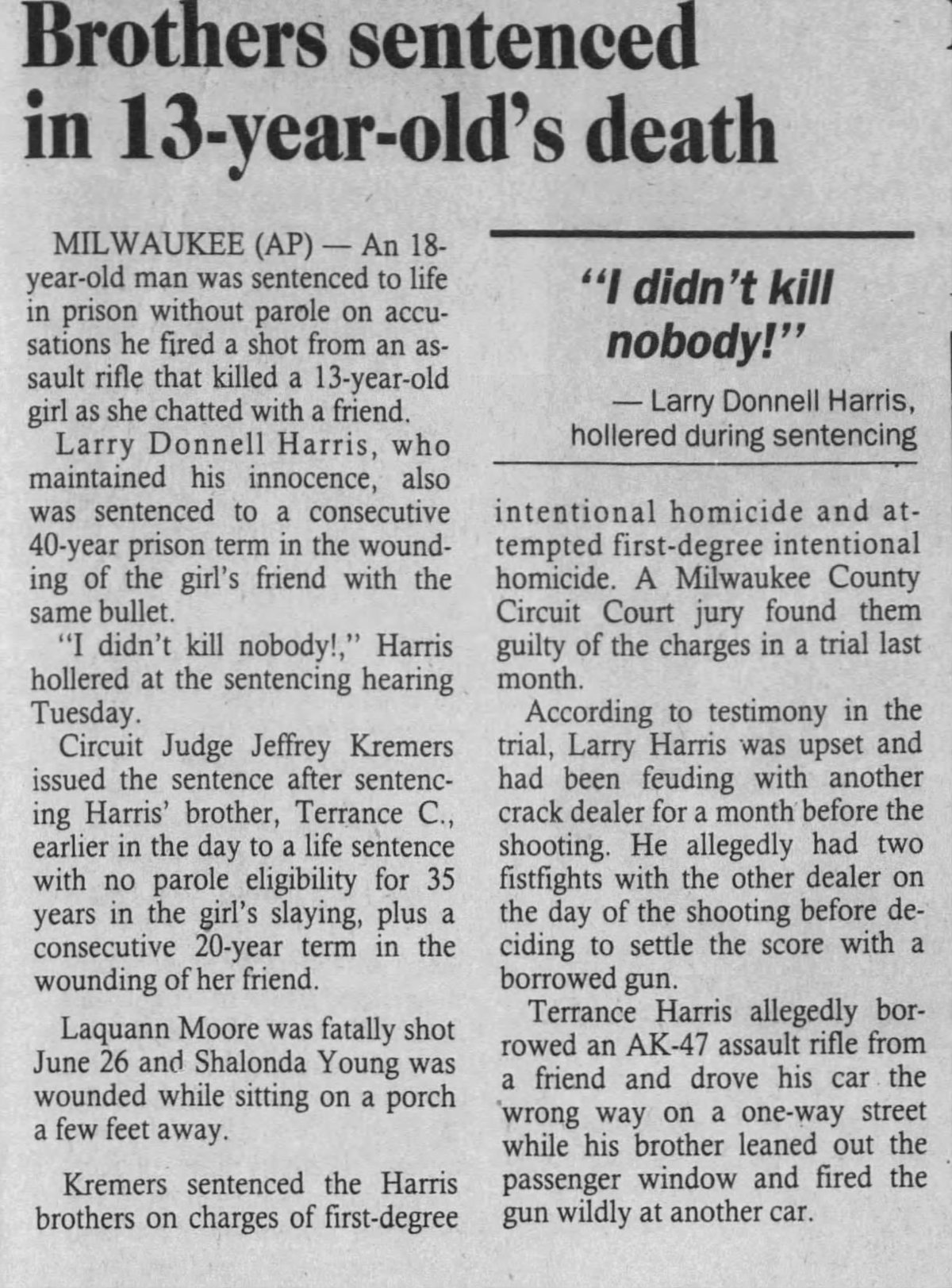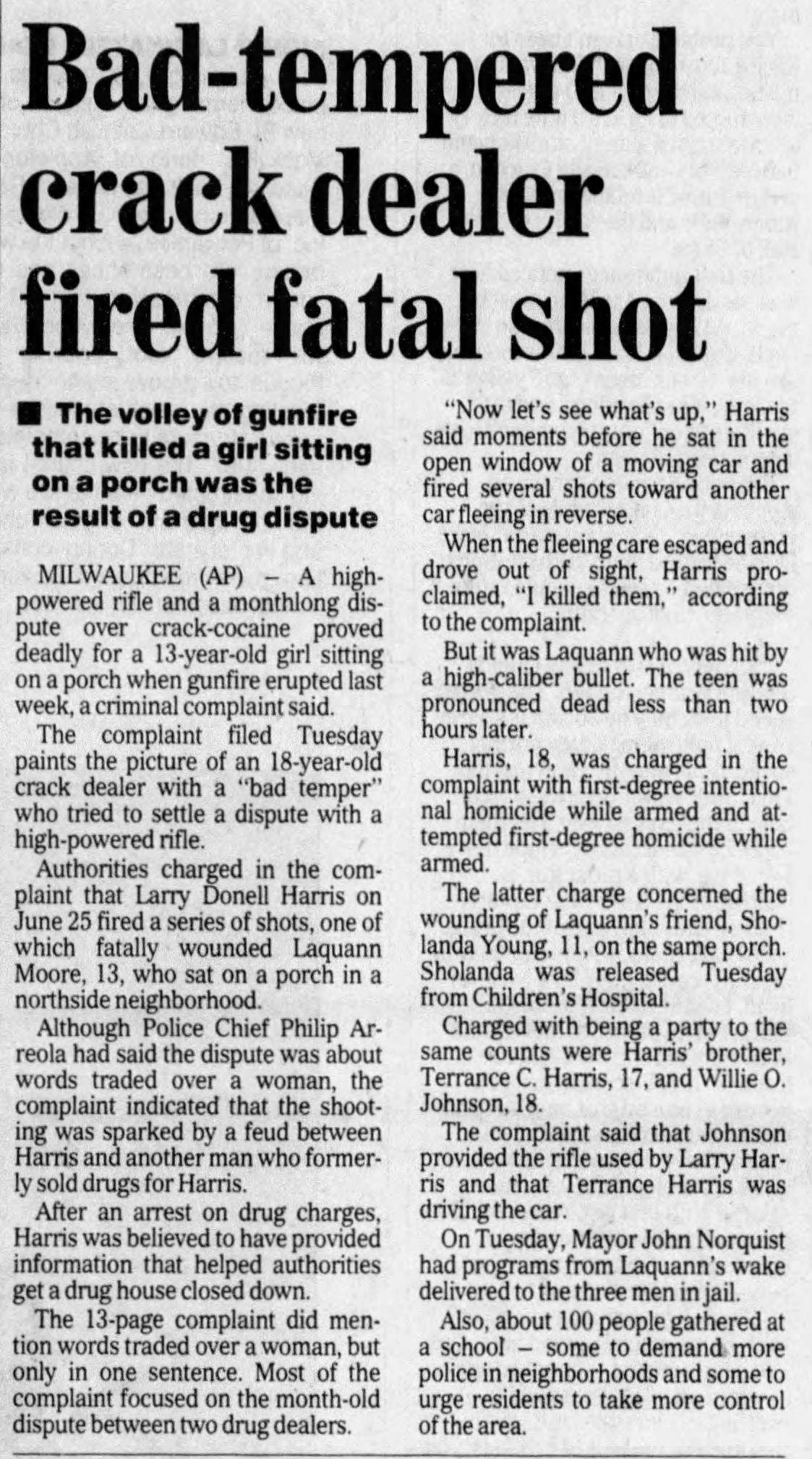FREED: Terrance Harris, Convicted in Murder of Laquann Moore, 13, as She Sat On Milwaukee Porch | Tony Evers' Killers & Rapists #18
Since 2019, Gov. Tony Evers' Parole Commission has released hundreds of convicted criminals, freeing them early on parole mostly into Wisconsin communities, including more than 270 murderers and attempted murderers, and more than 44 child rapists.
Terrance Harris was one of them. His release was discretionary.
18th in the series.
The death of a child is a community tragedy, and 13-year-old Laquann Moore's death was a big deal when it happened, galvanizing the City of Milwaukee against skyrocketing violent crime. Homicide numbers have been at record highs now for several years in a row, but back in 1996, the city was in the midst of its previous highest violent crime era.
The way the girl died tore at people's heartstrings; Laquann was simply sitting on a porch with her 11-year-old friend, Shalonda Young, when a bullet struck Laquann in the abdomen and traveled through her body into Shalonda's chest. Shalonda was wounded but survived. Laquann died that day.
A neighbor heard the shots “and ran to find Laquann lying on the porch,” according to a 1996 article in the Wisconsin State Journal.
She was “Lying in a pool of blood. You could tell she had tried to run by the way she was on the floor, but it also looked like she had been stopped dead in her tracks.”
Brothers Terrance and Larry Harris were convicted in the girl's murder. Milwaukee's mayor had programs from the girl's funeral sent to the men in jail.
Laquann had innocently scribbled over and over again in her school notebooks that "God loves Laquann." But she did not live to 14.
The girls caught stray bullets between two cars of warring crack dealers.
There was wall-to-wall news coverage when the girls were shot in 1996.
When Terrance Harris was paroled in 2020, no one published a word.
 Terrance Harris[/caption]
Date paroled: 8/14/2020 [You can check his parole date for yourself here by putting in his name and clicking on "movement"]
Current Residence: Eau Claire, WI
Age: 43
Convicted: First-degree intentional homicide, 1996
Sentence: Life sentence with no possibility of parole for 35 years, plus 20 years for the wounding of Laquann's 11-year-old friend. Life sentences do not quality for mandatory release. The parole was discretionary. Court records say: "Terrance was convicted of both charges by the jury and the trial court sentenced him to life imprisonment with a parole eligibility date in the year 2031 for the first charge, and gave him a twenty-year consecutive sentence on the second charge."
Terrance Harris[/caption]
Date paroled: 8/14/2020 [You can check his parole date for yourself here by putting in his name and clicking on "movement"]
Current Residence: Eau Claire, WI
Age: 43
Convicted: First-degree intentional homicide, 1996
Sentence: Life sentence with no possibility of parole for 35 years, plus 20 years for the wounding of Laquann's 11-year-old friend. Life sentences do not quality for mandatory release. The parole was discretionary. Court records say: "Terrance was convicted of both charges by the jury and the trial court sentenced him to life imprisonment with a parole eligibility date in the year 2031 for the first charge, and gave him a twenty-year consecutive sentence on the second charge."



 Laquann Moore[/caption]
Laquann Moore[/caption]
Evers' Parole Commission Freed Terrance Harris Early
[caption id="attachment_90050" align="alignleft" width="255"] Terrance Harris[/caption]
Date paroled: 8/14/2020 [You can check his parole date for yourself here by putting in his name and clicking on "movement"]
Current Residence: Eau Claire, WI
Age: 43
Convicted: First-degree intentional homicide, 1996
Sentence: Life sentence with no possibility of parole for 35 years, plus 20 years for the wounding of Laquann's 11-year-old friend. Life sentences do not quality for mandatory release. The parole was discretionary. Court records say: "Terrance was convicted of both charges by the jury and the trial court sentenced him to life imprisonment with a parole eligibility date in the year 2031 for the first charge, and gave him a twenty-year consecutive sentence on the second charge."
Terrance Harris[/caption]
Date paroled: 8/14/2020 [You can check his parole date for yourself here by putting in his name and clicking on "movement"]
Current Residence: Eau Claire, WI
Age: 43
Convicted: First-degree intentional homicide, 1996
Sentence: Life sentence with no possibility of parole for 35 years, plus 20 years for the wounding of Laquann's 11-year-old friend. Life sentences do not quality for mandatory release. The parole was discretionary. Court records say: "Terrance was convicted of both charges by the jury and the trial court sentenced him to life imprisonment with a parole eligibility date in the year 2031 for the first charge, and gave him a twenty-year consecutive sentence on the second charge."



The Victim: Laquann Moore, 13
[caption id="attachment_90060" align="aligncenter" width="138"] Laquann Moore[/caption]
Laquann Moore[/caption]


Comments
Post a Comment